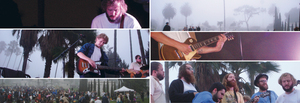The two sides of this Good Winter: Hollywood Forever
Sunday, Sept. 27 – Hollywood Forever
It looks inconspicuous enough online: “09.27.09: Los Angeles, CA — Hollywood Forever Cemetery (sunrise show).” The same font and color as every date on Bon Iver’s “Tour” page, followed by the same link to purchase tickets. The parentheses and words contained within marks the only difference between the various events. In retrospect, this nonchalant mention of an unconventional showtime seems a preposterous understatement. This was not simply a concert beginning as night turns to day, though that would have been exceptional enough. This was a seven-hour experience planned and executed by the artists themselves with delicate care and attention to detail simply not found in today’s world of promoters and tour managers.
For all the obscure and intriguing events planned, however, the night begins modestly. The regal and majestic gates at the entrance to the Hollywood Forever Cemetery remain firmly shut as attendees slip in through a nondescript side entrance and, after a brief stop at the folding table serving as ticket booth, disappear into the dimly lit grounds.
The doors, or rather, door, opens at midnight for the 6 a.m. concert, so the usual crowds and lines are curiously absent. A distant glow through the midnight fog and a few fellow concertgoers in the immediate vicinity are the only indications that something is in fact going on and you aren’t completely deranged for wandering into a cemetery after hours.
In migrating toward that distant glow and the ethereal melody that accompanies it, each group carves its own path through gravestones that range from monolithic shrines to stones that lay flat against the ground. One gets lost in the names and displays, trying to lay eyes on each of the captivating memorials.
The serene tour abruptly ends as wooded paths give way to the night’s largest gathering thus far. About 30 patrons gather around a small table covered in pastries and a booth from which coffee seems to flow like Willy Wonka’s river of chocolate — both provided free of charge. Once the initial shock from the provision of refreshments wears off — when most concerts attempt to nickel and dime their attendees at every turn — the source of the mysterious glow becomes apparent. The cemetery’s open lawn is covered in a patchwork of blankets and revelry, and those not entrenched in conversation with their peers gaze with wide-eyed wonder at the broad side of a white stone structure.
Programs litter the ground and reveal that Bon Iver’s hand-selected schedule has been providing entertainment since the night began. Two “DJ Sets” of handpicked music ranging from D’Angelo to the Vienna Boys Choir precede a viewing of Wes Anderson’s 1996 comedy Bottle Rocket. Planet Earth’s “Jungles” comes next and is followed by “5:15 AM: Blessing of Audience and Stage By Buddhist Monks”.
Sure enough, at 5:15 a.m. sharp, a procession of seven Buddhist monks in traditional orange robes appears in a small garden between the screen and adjacent stage. For the next 15 minutes, a chorus of intricate monosyllabic harmonies pour from their mouths with the precision and careful synchronization characteristic of, well, Buddhist monks.
The crowd itself represents a compelling mix of Los Angeles’ more eccentric cultural underbelly. To be sure, USC and UCLA garb dots the premises, but one also stumbles upon those like Sebastian, a rogue of a man in a tight leather jacket and even tighter jeans, a floppy leather hat sitting atop his disheveled mop. He and his similarly attired confidants swig wine while coaxing the last few hits from their near-finished blunt. Midnight graveyard shows seem to attract every sort of fan.
Shortly after the monks finish bestowing their blessings upon the stage and audience, Bon Iver begins its set without any of the tedious sound checks or egotistical stalling preferred by some of its musical contemporaries. In fact, nothing about the bands music or demeanor showed the slightest sense of such entitlement. Lead singer Justin Vernon donned a white T-shirt and the unkempt locks of someone who, as he later admitted to doing, just woke up from a nap. He then, with the help of his equally unpretentious bandmates, proceeds play the type of soulful, emotionally invested music that seems properly suited to usher night into day. The unassuming Vernon apologizes for the fact that band’s solitary album provides only a limited number of songs to perform, before he mentions that instead of concluding the show with the usual back-and-forth between artist and audience known as the encore, Bon Iver would be finishing its music before leaving the stage. For good. Seriously.
The band then played its last song, “Wolves (Acts I and II),” with the audience providing the aching, echoing chorus. They then thanked everyone who made the event possible and, as promised, promptly exited stage left in a manner that typified their evening. As extraordinary as the night’s events were, they did not speak to some higher genius of those who planned them. This was an artist deciding to leave the confines of the same show times at the same clubs and instead plan a night that he felt his fans would enjoy. It just makes sense, to the point that one becomes curious and almost annoyed as to why most bands refuse to branch out and present their art in a more unique way. After all, these are artists we’re talking about, whose performances are, at base, expressions of their own personal creativity. Why so many choose to present their work within the same exact frame as so many have done before them seems completely counterintuitive to the idea of individual artistic expression. It doesn’t need to be a seven-hour graveyard experience, but it doesn’t seem like asking too much to expect something creative and uncommon from those who call themselves artists.

